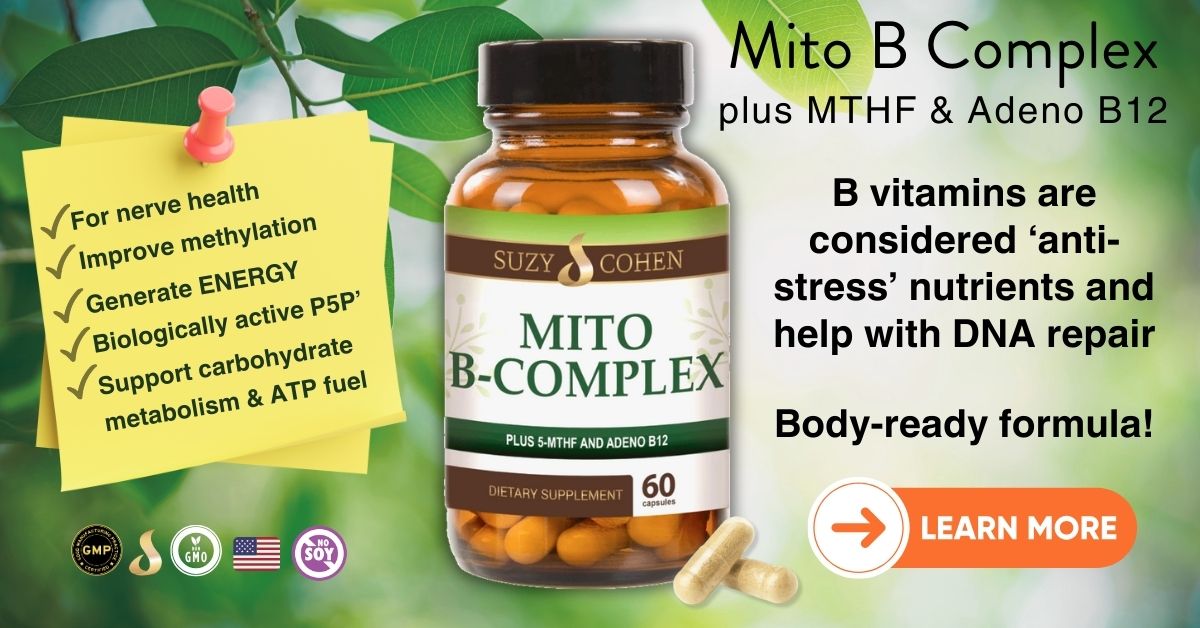What's On This Page?
ToggleAlmost everyone knows what prunes are for: they help get you going! Your parents probably kept them in the cabinet, and offered them to you when you were a kid.
Prunes are actually just dried plums, and they’re fruits of the tree species, Prunus domestica, hence the name. Speaking of names, which would you rather eat? Prunes or dried plums?
Honestly, what sounds more palatable? For purely marketing reasons, the name was changed to “dried plums” on many commercial labels back in 2001. The plum growers garnered FDA authorization to change prunes to “dried plums” due to the way people’s brains are wired to think of prunes for constipation (something considered derogatory I guess). So a lot of companies/distributors started putting dried plums on packaging instead of prunes, but it’s all the same, except the words “dried plums” garnered more mass appeal.
Whatever you want to call them, they’ve been eaten to help you “relieve” yourself. That brings up the age-old question, do prunes really relieve constipation? Or is this just another myth? Do they have other medicinal benefits? The short answer is YES and YES. Now the long answer…
YES! The little wrinkly dried fruit will help relieve constipation.
They’ve been scientifically proven to support healthy intestinal function and gut transit time. They’ve specifically been evaluated for their role in alleviating constipation, as shown in a number of STUDIES.
Eating prunes can improve stool frequency, as well as consistency, meaning that they soften your eliminations, while also allowing you to pass more of it. When you’re experiencing the discomfort of being all blocked up, as you might from eating too much protein and not enough fiber, eating dried plums can provide some relief.
Likewise, if the consistency is softer, it cuts down on bowel straining, which means less time on the potty. Furthermore, you’re less likely to form hemorrhoids. Hemorrhoids and varicose veins have some similarities, and if that topic interests you, CLICK HERE to read my other article, 12 Natural Remedies for Varicose Veins.
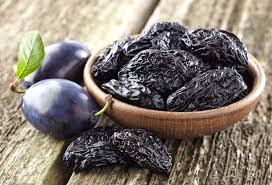
So aside from tasting good, eating prunes regularly may keep you regular, and thus reduce the risk for uncomfortable constipation problems such as hemorrhoids and hernias. These are the kinds of things no one wants to talk about, but I’m in the medical field so I’ve heard a lot from patients, and when these issues become serious, they can ruin your day, if not your life!
You may wonder how do the magical effects on your digestive system take place?
Part of the answer lies in fiber. Plums, like other fruits, contain quite a lot of fiber. Plums (like peaches) are super juicy and should be enjoyed whenever they are in season. Drying (dehydrating) plums into prunes will actually concentrate the fiber even more so.
The insoluble fiber found in all fruits and vegetables adds bulk to the stool and helps you retain water as the stool is in transit. This is what allows a person to “go” more comfortably. It’s all about the fiber and fluid in the bowel. This also explains why taking antihistamine drugs for allergies causes constipation in the subsequent days. It’s because these drugs have a drying effect on the bowel. If you’re trying to detoxify, you might be interested in chlorella. CLICK HERE to read my article, Chlorella is Nature’s #1 Detox Plant.
Anyway, fiber does not explain all of prunes’ ability to stimulate the intestines and transit time. They work better than psyllium husk, which is another popular constipation remedy that is very high in fiber. Psyllium husk is also helping relieve constipation. So if prunes only helped with constipation due to their fiber content, they’d work as well as psyllium, right?! Or any other dried fruit, for that matter.
But prunes work better for your bowels. Plus, compounds in prunes may also strengthen bones, reduce blood pressure, and even protect brain health. I’ll cover all that today.
Prunes Support Bowel Function
It turns out that prunes also contain “sorbitol.” Chemically classified as a “sugar alcohol,” this type of compound tastes sweet, but it isn’t a sugar. To be clear, there is a lab-created version of sorbitol often used as an artificial sweetener, which sometimes produces diarrhea in sensitive individuals! But the sorbitol that is in prunes and plums occurs naturally. Sorbitol is poorly absorbed through the intestinal lining, so most of it remains inside of your gut, where it draws in water and keeps it there. Think of a sponge. It soaks in water. By doing this, sorbitol keeps your feces soft, so it keeps things moving right along.
Too much sorbitol can actually lead to diarrhea, which is why you shouldn’t chew a whole pack of sugarless gum in a day! This is almost always sweetened with synthetic sorbitol, and a whole pack could be enough to keep you on the toilet for hours!
There’s more to this little fruit. Here’s a graphic I found showing you the nutritional facts of prunes, and you can see there is a lot of Vitamin K in these, which is helpful for your bones. I’ll discuss that next. Not listed in this graphic is the amount of fiber, which is 12 grams per cup, and is what causes their laxative effect. And they contain iron which is helpful for anemia. CLICK HERE to get more nutritional facts.
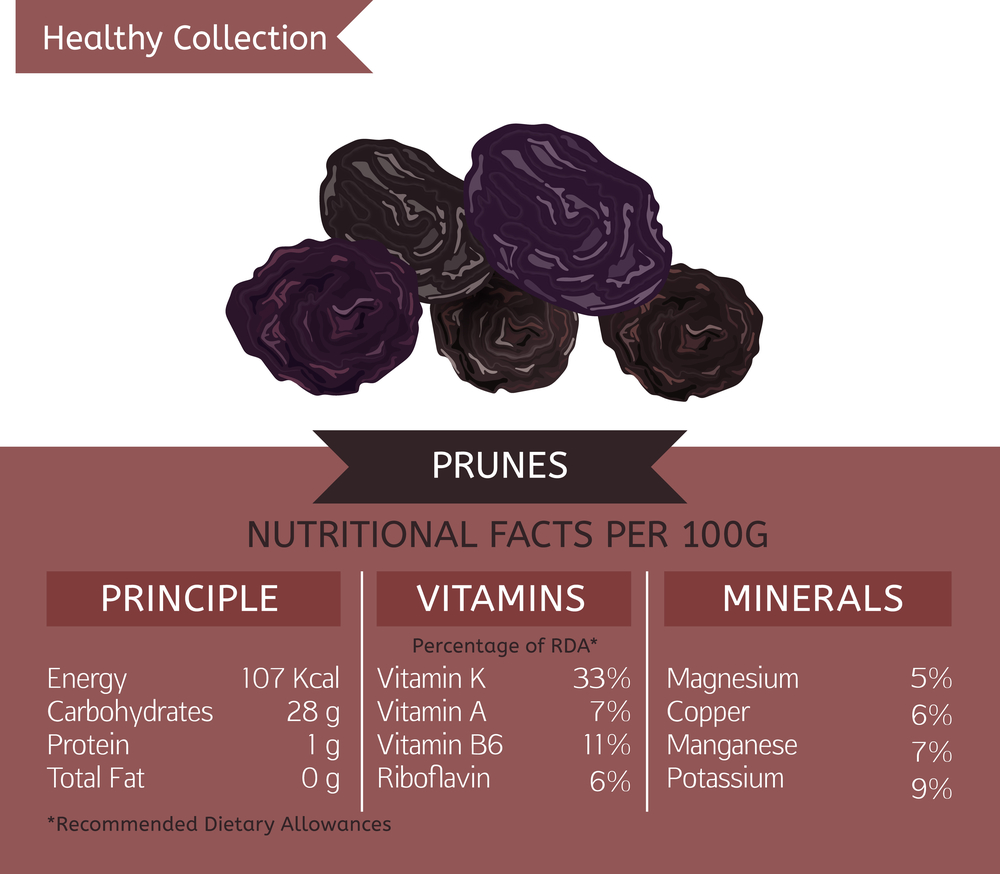
Prunes help your Bones and Osteoporosis
Prunes have been shown in multiple studies to prevent, and even reverse, bone loss in post-menopausal women. One cup of pitted prunes contains about 75 mg of calcium and 71 mg magnesium. They’re good for osteoporosis! They work better than dried apples, which is another fruit that contains a lot of fiber.
Prunes work by suppressing the rate of bone turnover. In fact, prominent researchers wrote an ARTICLE in the British Journal of Nutrition and after studying the dried plum fruits, they have come to this conclusion, “the most effective fruit in both preventing and reversing bone loss.”
In one long-term study, women who ate a serving of prunes daily for a year experienced dramatic improvements in their bone mineral density. This is impressive, but it gets even better. The effects remained detectable five years later, when the women who had eaten prunes years earlier still had improved bone mineral density compared to controls!
If you’d like to read more about that, CLICK HERE to read the study entitled, Bone-Protective Effects of Dried Plum in Postmenopausal Women: Efficacy and Possible Mechanisms. The two groups hadn’t been told to do anything different in those five years, but having eaten prunes daily for a year had a lasting effect on these women’s bones. Prunes contain a lot of Vitamin K, which is required for the metabolic pathway called “gamma-carboxylation of osteocalcin” which has to do with strengthening (remineralization) of your bones.
They help with the balance of calcium in your bones. This makes prunes a particularly useful functional food for older women, who are at high risk for bone loss. It’s estimated that over half of all adults over 50 have osteoporosis, or low bone mass, and as most of you already know, women are at higher risk for these issues compared to men.
There was a comprehensive review of 24 studies and the effect of prunes on bone health. The conclusion and take-home point of all the articles was that prunes protect our bones! If you’d like to read that you can CLICK HERE to read, Dried Plums, Prunes and Bone Health: A Comprehensive Review.
Eating prunes on a daily basis could help to protect against bone loss, to some degree, which in turn could help you to remain active well into your older years.
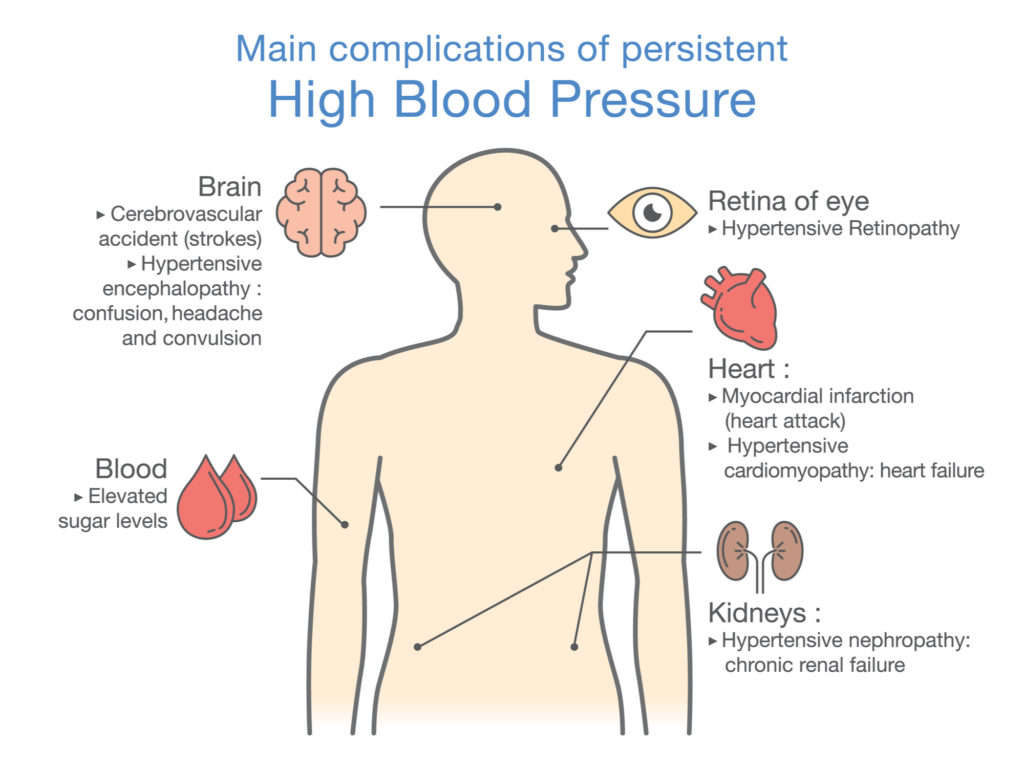
Lower Blood Pressure and Homocysteine
Recently, I mentioned prunes and how they could help you with your homocysteine levels.
Homocysteine is a biomarker associated with heart disease, and it’s also a neurotoxin in high amounts. If this topic interests you, CLICK HERE to read my article, Homocysteine is Connected to Mood and Mental Health.
Prunes help with vascular health in many ways. Their magnesium content supports healthy blood pressure levels.
A placebo-controlled TRIAL out of Pakistan showed that eating just one serving of prunes each day could significantly lower blood pressure in hypertensive patients.
Those who ate the prunes had a reduction in both their systolic and diastolic blood pressure (ie both the top and bottom numbers on the blood pressure reading).
I wonder how many doctors are suggesting prunes instead of a beta blocker… I mean, when you think about the simplicity of this adjunctive dietary treatment, it’s a little mind-blowing. I say that since hypertension is a risk factor for very serious health problems, such as strokes and heart attacks.
Keeping blood pressure regulated is important for staying healthy as you enter the golden years. (I wrote this blog in 2018, but today, I’m adding this one sentence in the year 2022, so you know that COVID binds to the human body via the ACE receptors in the body, this explains the cardiovascular consequences and hypertensive crisis sometimes associated with the infection.)
As a pharmacist, all I have ever seen from physicians are prescriptions for drugs, usually ACE inhibitors, beta blockers or ARBs. Basically, drugs and more drugs… and sometimes the standard recommendation for “diet and exercise” which most people don’t stay compliant with long-term.
But a directive to “Eat prunes daily!” would be so simple to say! And it could translate to reduced risk for catastrophe. Plus, there’s no interaction with any medication either.
Researchers still aren’t sure exactly what it is in prunes that helps keep blood pressure down. They’re very high in potassium, which might be one contributory benefit. They’re also rich in various phytochemical that serve as antioxidants, but again, none of this fully explains the effects prunes have on your cardiovascular system.
Prunes Help Brain Function
One cup of pitted prunes contains about 17mg of choline and choline forms “acetylcholine,” a memory molecule. In an animal model STUDY, feeding rodents an extract of plums helped to maintain their cognitive function. Not only was their memory recall improved, but the prunes also protected the brain on a cellular level. Under a microscope, prunes prevented the appearance of Beta amyloid plaques, which are the same neurodegenerative protein expressed in the brains of Alzheimer’s patients!

The brain-protecting properties of prunes are believed to be largely attributable to a group of compounds called anthocyanins. These are blue, purple, or red pigments found in many plant foods, even blackberries and blueberries.
These natural pigments have double strong neuroprotectants. They help to protect cells from damage by free radicals, which are toxic byproducts that are formed when cells make energy using oxygen. Antioxidants mop up these toxins before they can cause harm.
If you are interested in building a better brain using antioxidant-rich foods, then CLICK HERE to receive your own copy of an ebook I wrote entitled, Recipes for Better Memory.
FYI, a “stone fruit” is one that encloses a pit such as a plum or prune, mango, lychee, peach and cherry. Another stone fruit, the tart cherry, has also been shown to have brain-protecting effects according to this STUDY, probably because it also contains high levels of anthocyanins. Anthocyanins aren’t just protective for the brain. They have also been studied for their role in protecting the body from cancer and other chronic illnesses. You can read that article by CLICKING HERE.
When you’re constipated, reach for a handful of prunes to help get things moving again. The juice will not work that well, because the fruit gives you the fiber and the juice does not. But even if everything is moving right along, consider eating a few prunes a day to help protect your bones, keep your blood pressure down, and maintain your brain health. Men and women over 50 should definitely consider eating this functional food, since this age automatically means higher risk for bone loss.
⚠️ Caution: Just be sure you don’t eat too many prunes. Like any good thing, too much is bad and may provoke diarrhea and dehydration. There is also a question mark by some people in California about prune juice, so you can read about that by CLICKING HERE.
All it takes is one a day for some of you, and for others, perhaps a handful of prunes a day (about 8-10) to get the benefits you need. If you’re constipation is due to opiate usage (such as oxycodone or hydrocodone) then this would require an OTC aid; the prunes will likely not be enough! If your constipation is due to hypothyroidism, fruit will likely not be enough, you will need to take a thyroid supplement or thyroid hormone medication to correct chronic constipation. For that, you may be interested in Thyroid Script.
To learn more about hypothyroidism, click on the image below to get your FREE copy of my ebook, Hypothyroidism: 5 Reasons You Don’t Get Well.
How to get more prunes in your day…
You don’t have to just grab them from the bag and pop them in your mouth, although you can if you want! Their sweet taste is definitely craveable.
Like most dried fruits, they’re great on a salad, but you might be surprised at how great they can taste in a savory dish as well. I know of one friend who swears by chicken with prunes! She adds them to cooked chicken casserole, just throws them on top of it! If you simply can’t stand that thought, then regular plums will be a great alternative for you! They contain the same anthocyanins that dried plums do, and they are even juicier!
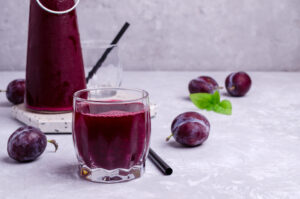
Here are other ways to enjoy “dried plums”
1. Prune juice is an option for some of the medicinal benefits discussed above. It doesn’t have the fiber of whole prunes, so it won’t help with constipation. But again, it does contain the other powerful health-protecting ingredients.
2. You could also eat fresh plums (instead of dried ones). This would be one way to help children with constipation who don’t like the sticky ‘prunish’ feel of the dried, wrinkly fruit. Cut them up and put into a salad, or eat them whole.
3. Make a superfood recipe to keep you feeling regular, as well as energetic, due to the addition of hemp seed. Try making my easy Coconutty Prune Balls.
4. Make my RECIPE for Applesauce Prune Muffins. In fact, if you have a recipe for date muffins, or other date-inspired recipes… you can almost always substitute prunes for dates.
CLICK LIKE to FOLLOW Suzy Cohen – Get Important Health Tips

Suzy Cohen, has been a licensed pharmacist for over 30 years and believes the best approach to chronic illness is a combination of natural medicine and conventional. She founded her own dietary supplement company specializing in custom-formulas, some of which have patents. With a special focus on functional medicine, thyroid health and drug nutrient depletion, Suzy is the author of several related books including Thyroid Healthy, Drug Muggers, Diabetes Without Drugs, and a nationally syndicated column.
